高二人教版英语必修五unit1复习教案
人教版英语必修五 Unit 1 全单元教案
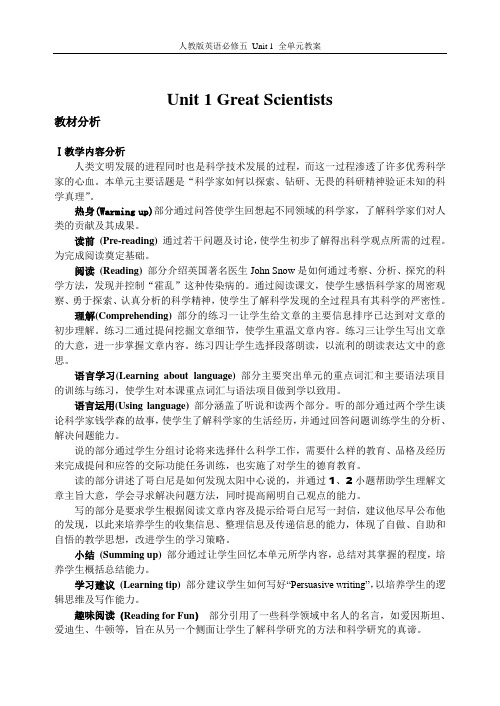
Unit 1 Great Scientists教材分析Ⅰ教学内容分析人类文明发展的进程同时也是科学技术发展的过程,而这一过程渗透了许多优秀科学家的心血。
本单元主要话题是“科学家如何以探索、钻研、无畏的科研精神验证未知的科学真理”。
热身(Warming up)部分通过问答使学生回想起不同领域的科学家,了解科学家们对人类的贡献及其成果。
读前(Pre-reading) 通过若干问题及讨论,使学生初步了解得出科学观点所需的过程。
为完成阅读奠定基础。
阅读(Reading) 部分介绍英国著名医生John Snow是如何通过考察、分析、探究的科学方法,发现并控制“霍乱”这种传染病的。
通过阅读课文,使学生感悟科学家的周密观察、勇于探索、认真分析的科学精神,使学生了解科学发现的全过程具有其科学的严密性。
理解(Comprehending) 部分的练习一让学生给文章的主要信息排序已达到对文章的初步理解。
练习二通过提问挖掘文章细节,使学生重温文章内容。
练习三让学生写出文章的大意,进一步掌握文章内容。
练习四让学生选择段落朗读,以流利的朗读表达文中的意思。
语言学习(Learning about language) 部分主要突出单元的重点词汇和主要语法项目的训练与练习,使学生对本课重点词汇与语法项目做到学以致用。
语言运用(Using language) 部分涵盖了听说和读两个部分。
听的部分通过两个学生谈论科学家钱学森的故事,使学生了解科学家的生活经历,并通过回答问题训练学生的分析、解决问题能力。
说的部分通过学生分组讨论将来选择什么科学工作,需要什么样的教育、品格及经历来完成提问和应答的交际功能任务训练,也实施了对学生的德育教育。
读的部分讲述了哥白尼是如何发现太阳中心说的,并通过1、2小题帮助学生理解文章主旨大意,学会寻求解决问题方法,同时提高阐明自己观点的能力。
写的部分是要求学生根据阅读文章内容及提示给哥白尼写一封信,建议他尽早公布他的发现,以此来培养学生的收集信息、整理信息及传递信息的能力,体现了自做、自助和自悟的教学思想,改进学生的学习策略。
人教高中英语必修五:Unit+1教案-1.doc
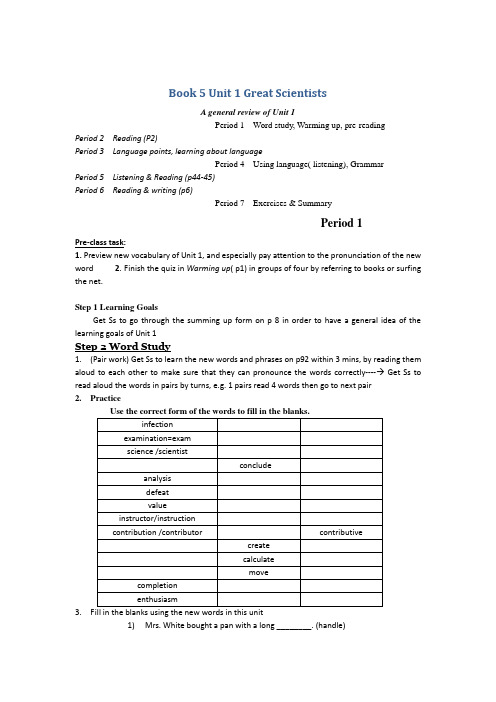
Book 5 Unit 1 Great ScientistsA general review of Unit 1Period 1 Word study, Warming up, pre-readingPeriod 2 Reading (P2)Period 3 Language points, learning about languagePeriod 4 Using language( listening), GrammarPeriod 5 Listening & Reading (p44-45)Period 6 Reading & writing (p6)Period 7 Exercises & SummaryPeriod 1Pre-class task:1. Preview new vocabulary of Unit 1, and especially pay attention to the pronunciation of the new word2. Finish the quiz in Warming up( p1) in groups of four by referring to books or surfing the net.Step 1 Learning GoalsGet Ss to go through the summing up form on p 8 in order to have a general idea of the learning goals of Unit 1Step 2 Word Study1. (Pair work) Get Ss to learn the new words and phrases on p92 within 3 mins, by reading them aloud to each other to make sure that they can pronounce the words correctly---- Get Ss to read aloud the words in pairs by turns, e.g. 1 pairs read 4 words then go to next pair2. Practice3.1)Mrs. White bought a pan with a long ________. (handle)2)The pollution is so ________ that we have to take some measures to stop it.(severe)3)He has a big nose that is a ________ of his family. (characteristic)4)Water and salt are ________ into our blood stream every day. (absorbed)5)If a doctor or a medical treatment ________ someone’s illness, they make theperson well again. (cure)6) A ________ is a kind of germ that can cause disease. (virus)Step 3. Warming up(Group competition) Check the answers to the quiz to find out which group know the most . Show pictures to introduce some scientists while Ss giving the correct answers-- congratulations to the winning groupStep 4 Pre-reading1. (Pair work) What five most important qualities do you think a scientist should have? Give reasons.clever/talented strict patient creative determined/strong-willed positivehonest energetic intelligent/hard-working ambitious careful co-operativeconfident brave2. (Group work) Ex2, p1Do you know how to prove a new idea in scientific research? Discuss in groups the stages in examining a new scientific idea. What order would you put them in?Draw a conclusion Think of a method Collect results Make up a question Find a problem Analyse the results Repeat if necessaryStep 5. Summary1.Seeing much, suffering much, and studying much are three pillars (支柱,要素) of learning.2.learning without thought is a labour lost; thought without learning is perilous(危险的)3. To know the disease is half the cure. 找出病根等于医治了一半。
高二英语必修5 unit 1-2复习教学案
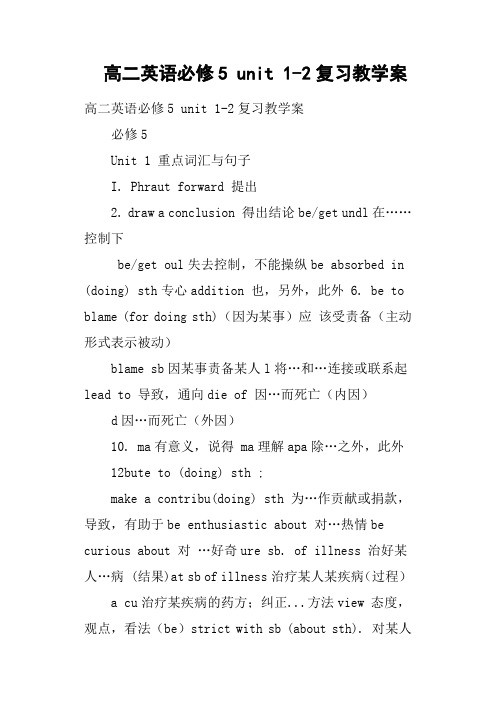
高二英语必修5 unit 1-2复习教学案高二英语必修5 unit 1-2复习教学案必修5Unit 1 重点词汇与句子I. Phraut forward 提出2. draw a conclusion 得出结论be/get undl在……控制下be/get oul失去控制,不能操纵be absorbed in (doing) sth专心addition 也,另外,此外 6. be to blame (for doing sth)(因为某事)应该受责备(主动形式表示被动)blame sb因某事责备某人l将…和…连接或联系起lead to 导致,通向die of 因…而死亡(内因)d因…而死亡(外因)10. ma有意义,说得 ma理解apa除…之外,此外 12bute to (doing) sth ;make a contribu(doing) sth 为…作贡献或捐款,导致,有助于be enthusiastic about 对…热情be curious about 对…好奇ure sb. of illness 治好某人…病 (结果)at sb of illness治疗某人某疾病(过程) a cu治疗某疾病的药方;纠正...方法view 态度,观点,看法(be)strict with sb (about sth). 对某人(某事)要求严格xpose … to …使显露,暴露be exposed显露,暴露于20. lead to (doing) sth 导致,通向21. l调查,研究22. thousands of 成千上万23. be dd to do 下定决心做某事24. suspecbt sb of (doing) sth 怀疑某人(做)某事2uct sb to do sth 命令,指导某人做某事26.be unduction 正在建设中 2al chara物理特征2arch 科学研究2us diseases 传染性疾Ⅱ约翰斯诺是伦敦一位著名的医生――他的确医术精湛,因而成为维多利亚女王的私人大夫。
人教版英语必修五Unit 1(John Snow defeats_King Cholera)教学教案
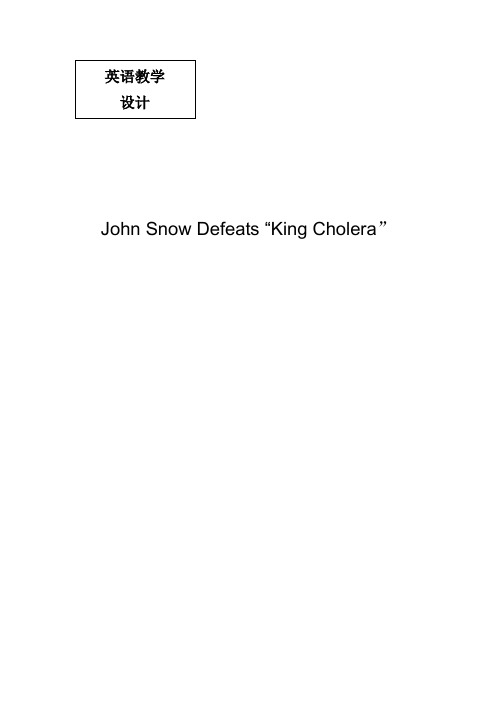
John Snow Defeats “King Cholera”Unit 1 John Snow Defeats “King Cholera”Teaching Goals:1. Enable the Ss to get to know some knowledge about Cholera.2. Enable the Ss to understand the passage well.3. Let the Ss learn some reading skills by scanning and skimming.4. To learn from the great scientists and develop the noble spirits . key points:1. To train the reading skills of skimming, scanning and careful reading;2. To master the details of the passage and appreciate the spirits of the scientists.Difficult points1. To develop the students’ ability of grasping the main idea of each paragraph.2. To get some detailed information by reading the text. Teaching methods1. Skimming & scanning2. Discussion methods3. Pair work of group4. CompetitionTeaching process:Step 1 Lead in本单元标题是伟大的科学家。
所以活动的设置为让学生说出自己熟知的科学家姓名、其发明、工作、生活的情况。
高二英语必修5unit1-2复习教学案(标准版)
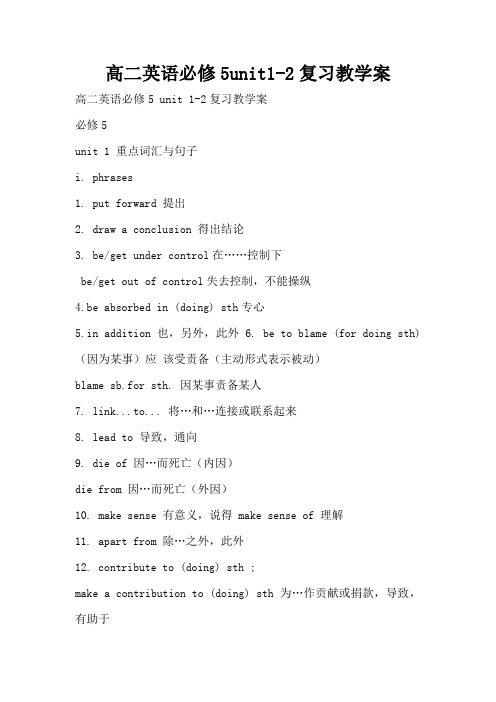
高二英语必修5unit1-2复习教学案高二英语必修5 unit 1-2复习教学案必修5unit 1 重点词汇与句子i. phrases1. put forward 提出2. draw a conclusion 得出结论3. be/get under control在……控制下be/get out of control失去控制,不能操纵4.be absorbed in (doing) sth专心5.in addition 也,另外,此外6. be to blame (for doing sth)(因为某事)应该受责备(主动形式表示被动)blame sb.for sth. 因某事责备某人7. link...to... 将…和…连接或联系起来8. lead to 导致,通向9. die of 因…而死亡(内因)die from 因…而死亡(外因)10. make sense 有意义,说得 make sense of 理解11. apart from 除…之外,此外12. contribute to (doing) sth ;make a contribution to (doing) sth 为…作贡献或捐款,导致,有助于13. be enthusiastic about 对…热情14. be curious about 对…好奇15. cure sb. of illness 治好某人…病 (结果)treat sb of illness治疗某人某疾病(过程)a cure of sth 治疗某疾病的药方;纠正...方法16. point of view 态度,观点,看法17.(be)strict with sb (about sth). 对某人(某事)要求严格19.expose … to …使显露,暴露be exposed to sth 显露,暴露于20. lead to (doing) sth 导致,通向21. look into 调查,研究22. thousands of 成千上万23. be determined to do 下定决心做某事24. suspecbt sb of (doing) sth 怀疑某人(做)某事25. instruct sb to do sth 命令,指导某人做某事26.be under construction 正在建设中27.physical characteristics 物理特征 28.scientific research 科学研究29.infectious diseases 传染性疾ⅱ.sesentences1. 约翰•斯诺是伦敦一位著名的医生――他的确医术精湛,因而成为维多利亚女王的私人大夫。
必修五 Unit1教案
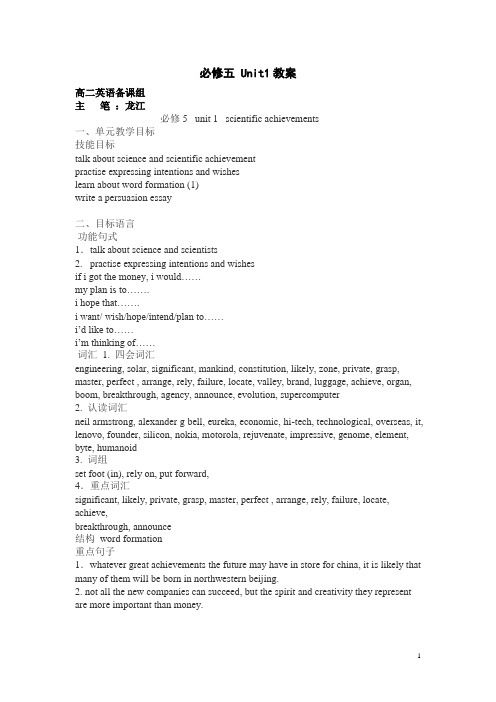
必修五 Unit1教案高二英语备课组主笔:龙江必修5 unit 1 scientific achievements一、单元教学目标技能目标talk about science and scientific achievementpractise expressing intentions and wisheslearn about word formation (1)write a persuasion essay二、目标语言功能句式1.talk about science and scientists2. practise expressing intentions and wishesif i got the money, i would……my plan is to…….i hope that…….i want/ wish/hope/intend/plan to……i’d like to……i’m thinking of……词汇1. 四会词汇engineering, solar, significant, mankind, constitution, likely, zone, private, grasp, master, perfect , arrange, rely, failure, locate, valley, brand, luggage, achieve, organ, boom, breakthrough, agency, announce, evolution, supercomputer2. 认读词汇neil armstrong, alexander g bell, eureka, economic, hi-tech, technological, overseas, it, lenovo, founder, silicon, nokia, motorola, rejuvenate, impressive, genome, element, byte, humanoid3. 词组set foot (in), rely on, put forward,4.重点词汇significant, likely, private, grasp, master, perfect , arrange, rely, failure, locate, achieve,breakthrough, announce结构word formation重点句子1.whatever great achievements the future may have in store for china, it is likely that many of them will be born in northwestern beijing.2. not all the new companies can succeed, but the spirit and creativity they represent are more important than money.三、教材分析与教材重组1. 教材分析通过学习了解人类的科学成就,帮助学生认识到这些成就深刻地改变了人类生产和生活的方式及质量,同时也深刻地改变了人类的思维观念和对世界的认识,改变并继续改变着世界的面貌,极大地推动了社会的发展。
人教版英语必修五 Unit 1 教案
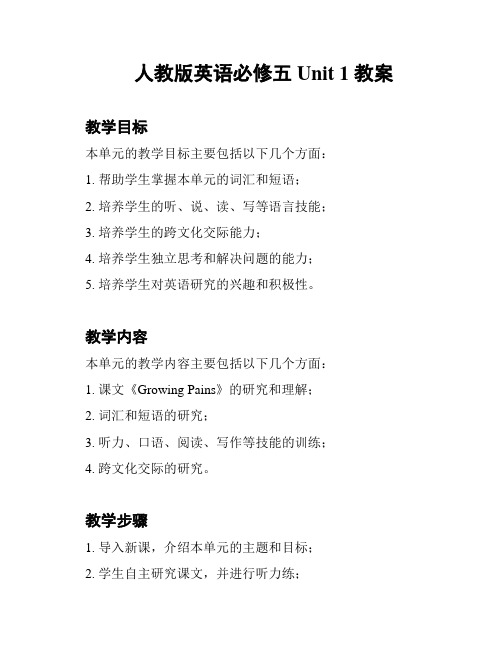
人教版英语必修五 Unit 1 教案教学目标本单元的教学目标主要包括以下几个方面:1. 帮助学生掌握本单元的词汇和短语;2. 培养学生的听、说、读、写等语言技能;3. 培养学生的跨文化交际能力;4. 培养学生独立思考和解决问题的能力;5. 培养学生对英语研究的兴趣和积极性。
教学内容本单元的教学内容主要包括以下几个方面:1. 课文《Growing Pains》的研究和理解;2. 词汇和短语的研究;3. 听力、口语、阅读、写作等技能的训练;4. 跨文化交际的研究。
教学步骤1. 导入新课,介绍本单元的主题和目标;2. 学生自主研究课文,并进行听力练;3. 进行课文的理解和讨论,引导学生思考和表达观点;4. 研究和掌握本单元的词汇和短语;5. 进行听说训练,提高学生的口语表达能力;6. 进行阅读和写作训练,培养学生的阅读理解和写作技能;7. 进行跨文化交际的研究,增进学生对英语和其他文化的认识。
教学评价本单元的教学评价主要以以下方式进行:1. 各种形式的课堂练和作业,检测学生对知识的掌握程度;2. 口语和写作表现的评价,评估学生语言运用的能力;3. 学生参与课堂讨论和发言的情况,评估学生的思维能力和表达能力。
教学资源本单元的教学资源包括以下几个方面:1. 课本《人教版英语必修五》;2. 音频材料;3. 多媒体设备;4. 教学课件和作业练册。
以上为《人教版英语必修五 Unit 1 教案》的简要内容,旨在帮助教师设计和安排本单元的教学活动。
具体的教学步骤和细节应根据实际情况进行调整和完善。
英语优秀教案(人教版):必修五(Unit 1 Great scientists Period 1)
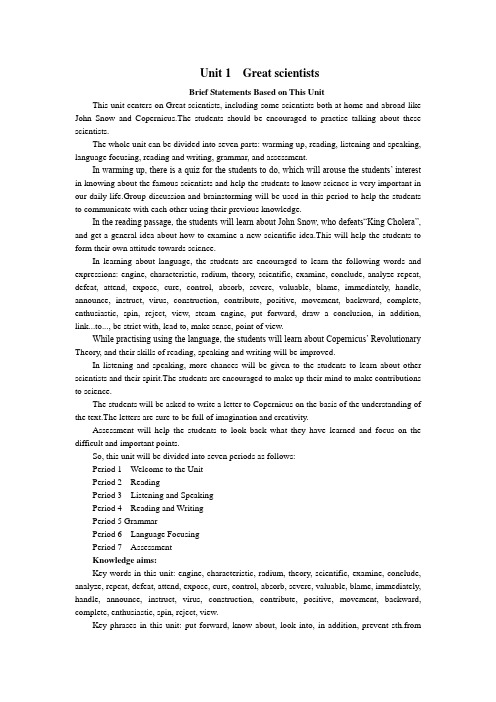
Unit 1Great scientistsBrief Statements Based on This UnitThis unit centers on Great scientists, including some scientists both at home and abroad like John Snow and Copernicus.The students should be encouraged to practise talking about these scientists.The whole unit can be divided into seven parts: warming up, reading, listening and speaking, language focusing, reading and writing, grammar, and assessment.In warming up, there is a quiz for the students to do, which will arouse the students’ interest in knowing about the famous scientists and help the students to know science is very important in our daily life.Group discussion and brainstorming will be used in this period to help the students to communicate with each other using their previous knowledge.In the reading passage, the students will learn about John Snow, who defeats“King Cholera”, and get a general idea about how to examine a new scientific idea.This will help the students to form their own attitude towards science.In learning about language, the students are encouraged to learn the following words and expressions: engine, characteristic, radium, theory, scientific, examine, conclude, analyze repeat, defeat, attend, expose, cure, control, absorb, severe, valuable, blame, immediately, handle, announce, instruct, virus, construction, contribute, positive, movement, backward, complete, enthusiastic, spin, reject, view, steam engine, put forward, draw a conclusion, in addition, link...to..., be strict with, lead to, make sense, point of view.While practising using the language, the students will learn about Copernicus’ Revolutionary Theory, and their skills of reading, speaking and writing will be improved.In listening and speaking, more chances will be given to the students to learn about other scientists and their spirit.The students are encouraged to make up their mind to make contributions to science.The students will be asked to write a letter to Copernicus on the basis of the understanding of the text.The letters are sure to be full of imagination and creativity.Assessment will help the students to look back what they have learned and focus on the difficult and important points.So, this unit will be divided into seven periods as follows:Period 1Welcome to the UnitPeriod 2ReadingPeriod 3Listening and SpeakingPeriod 4Reading and WritingPeriod 5 GrammarPeriod 6Language FocusingPeriod 7AssessmentKnowledge aims:Key words in this unit: engine, characteristic, radium, theory, scientific, examine, conclude, analyze, repeat, defeat, attend, expose, cure, control, absorb, severe, valuable, blame, immediately, handle, announce, instruct, virus, construction, contribute, positive, movement, backward, complete, enthusiastic, spin, reject, view.Key phrases in this unit: put forward, know about, look into, in addition, prevent sth.fromdoing, lead to, make sense, punish sb.for, suggest doing sth.steam engine, draw a conclusion, link...to..., be strict with, lead to, point of view.Key sentence patterns:1 But he became inspired when he thought about helping ordinary people exposed to cholera.2 He got interested in two theories explaining how cholera killed people.3 Only if you put the sun there did the movements of the other planets in the sky make sense.Grammar in this unit:Past participle used as attribute and predicativeAbility aims:1.To talk about great scientists and their great achievements.2.To guess what will be talked about in the listening materials.3.To improve their reading skills.4.To learn to use past participle as attribute and predicative.Emotion aims:To encourage the students to learn about some great scientists and their great achievements and how science helps to improve our society and change our life.Meanwhile, inspire the students to learn from the scientists and form their positive attitude towards science.Period 1Welcome to the UnitThe General Idea of This PeriodThe uni t centers on“great scientists”.This is the first period of this unit.During this period, the students should be encouraged to give their previous knowledge of some of the famous scientists, participate in the activities in class and try to get more information from the discussion.They will take part in different forms of activities, including pair work, group work, competition, and quiz.Group competition will be carried out all through the class.Words and expressions in this unit will help the students to talk about the topic“great scientists”.So at the beginning of this period, the teacher should spend some time training the students to read them and help the students pronounce them correctly.The students are encouraged to learn the new words in groups by themselves, using dictionaries and other reference books.Then more time should be given to the students to get familiar with the words and stly, several sentences will be given to the students to help them to know how to use some of the phrases.This unit is about“great scientists”, so from the very beginning, the teacher can encourage the students talk about their dreams in the future.Then the teacher can let the students brainstorm something about great scientists.The students are free to say anything that they know.The students will be quite interested in this topic.This activity gives the students a chance to express their feelings about their favorite scientist.At the same time, this activity can stir the students’ enthusiasm in science.Then the teacher can have the students match the famous scientists with their discoveries, inventions or theories, making sure that they have some common sense about some world-famous scientists.Later the students will be divided into several groups, describe one of the great scientists and let other students guess who he or she is talking about.In this way, the students should learn to organize their own sentences and express their ideas clearly.After that, the students will feel comfortable to do the quiz in the text.The students should beencouraged to give more information about these ten scientists.Meanwhile, the students’ interest in scientists and science should be cultivated.So two topic discussion questions, as well as the practice exercises are designed.The post-class activities are designed to arouse the students’ interest in science and encourage them to“DIY—do it yourself” in their daily life if they have some doubt in some areas.T eaching Important PointsHave the students discuss great scientists.Encourage the students to hold their views about their future career.Understand and learn the following words and expressions: engine, characteristic, radium, theory, scientific, examine, conclude, analyse, repeat, defeat, attend, expose, cure, control, absorb, severe, valuable, blame, immediately, handle, announce, instruct, virus, construction, contribute, positive, movement, backward, complete, enthusiastic, spin, reject, view, steam engine, put forward, draw a conclusion, in addition, link...to..., be strict with, lead to, make sense, point of view.T eaching DifficultiesWhat can we learn from the scientists?What should we do in our daily life to develop our interest and love for science?T eaching AidsCAI equipment with a Multi-media classroom and other normal teaching tools.Three Dimensional T eaching AimsKnowledge AimsLearn something about some famous scientists in the world.Know about the outstanding discoveries, inventions and theories from some well-known scientists.Try to understand and learn the important words and expressions.Ability AimsDevelop the students’ ability of speaking.Encourage the students to give more information about the great scientists.Emotional AimsEncourage the students to learn more about the great scientists and learn from them.Help the students to form the good habit in learning and encourage the students to take part in social practice.Help the students to realize that it is scientific spirit that makes those scientists successful.Encourage the students to develop their love for science.T eaching ProcedureStep 1 GreetingTeacher: Hello, everyone.Teacher: Hello, Mr.../Ms...Step 2 Lead inT: I’m very glad to see you all here.After a long holiday, all of you look energetic and happy.I hope that we will work hard together happily all through the year.I do believe that a bright future is waiting for you.We are sure to realize our dreams in the near future.By the way, I’d like to know what you would like to be in the future.Let me share your dreams.Anyone who gives your idea will get a star for your group.Ready?Go!S: I admire Y ang Liwei very much, who is a great honour to our motherland.I’d like to be an astronaut like him.T: Y eah, the spacecraft, Shenzhou V, orbited the earth 14 times in 21 hours, making China the third country to have successfully sent an astronaut into space.I hope you will realize your dream.S: I want to be a doctor.I hope I’ll be an outstanding one and be expert in finding cures for different kinds of cancers.T: That’s a good idea.There are so many patients with cancers in the world, who are suff ering a lot.Thank you!S: I want to be an English teacher like you.For one thing, I like English very much; for another, you are not only strict with us but also patient with us.Y ou are just our friends and maybe more than our friends sometimes.T: I’m really glad to hear that.It’s my great honor to be your friends and I like my job very much.S: I’d like to be an expert in environment.Y ou see, with the development of industry, our globe is seriously polluted.Dirty water, polluted air, and loud noise make our living conditions worse.I think we should leave a beautiful world to the next generation.T: Y es, someone predicted that the last drop of water in the world would be the tear of human being’s.I think all of us should pay attention to our environment, and make our contributions to improving the environment.S: I’m so interested in physics.And I have read Stephen Hawking’s A Brief History of Time twice.I hope I will be a scientist like him.As we all know, the development of our society will go hand in hand with the development of science.T: Y eah, I can’t agree with you more.Science plays an i mportant part in the development of our society.There are so many examples in the history of human beings.Ss: ...T: I’m so glad to share your dreams.Y our ambition and careful thoughts really leave a good and amazing impression on me.I like them.In this unit, you will learn something about“Great scientists”.Maybe you will know what you need in your efforts to realize your dreams after we talk about some world-famous scientists.Before we come to“Warming up”, I’d like you to come to the new words in this unit, which will help you to learn this unit.Step 3 Word puzzlesT: Open your books and turn to Page 92.Let’s read the words and expressions together.(Let the students read the words and expressions together.Help them pronounce the new words and expressions ter give them some time to practise reading and remember some easy and important ones.Give more help to those who are poor in pronunciation.) T: Here are some definitions of some of the words from this unit.Please work in pairs and match the words with their definitions.(group competition)Words Definitions or explanationsA.examine 1.general principles of an art or scienceB.repeat 2.say or do againC.theory 3.at once; without delayD.immediately 4.look at...carefully in order to learn about or from...plete 5.of great value, worth or useF.valuable 6.having all its parts; whole; finishedG.announce 7.make knownH.control e or bring to an endI.positive 9.power to order or directJ.conclude 10.quite certain or sureT: Now, let’s check the answers.A—4, B—2, C—1, D—3, E—6, F—5, G—7, H—9, I—10, J—8. Y ou have done a good job.I will give you some more minutes to go over all the words and expressions and then fill in the blanks with proper forms of some of them from this unit.1.“All roads lead to Rome, ”he encouraged me after I failed the entrance examination.2.This sentence doesn’t make any sense.3.Our English teacher is not only strict with us but also friendly to us.4.He is good-looking, apart from his nose.5.It is announced that the spacecraft, Shenzhou Ⅵ, landed on the earth successfully.6.It is not Tom but you who are to blame.7.In 1995, the Chinese government put forward a plan for“rejuvenating the nation by relying on science and education”.And it has helped Chinese scientists make m any breakthroughs.8.Have you drawn any conclusion after you read this passage?T: Well done.So much for the learning of the new words and expressions.Step 4 BrainstormingT: Now let’s come to the title of this unit Great scientists.When we talk about g reat scientists, what will come into your mind(s)?We will go on our competition.S1: Madame Curie, who got two Nobel Prizes, one for physics and the other for chemistry, is really outstanding among all the women scientists.S2: It reminds me of the great inventor named Thomas Alva Edison and one of his famous sayings“Genius is one percent inspiration and ninety-nine percent perspiration.”S3: Y es, we lead a better life now with the help of science.Without Edison, maybe now we are still living in a dark world.They really make our life easier and more comfortable.S4: I also think of one of the quotes from Albert Einstein, “Imagination is more important than knowledge.”S5: All the scientists are devoted to the career that they choose, and they set good examples to us in our work.S6: Take all the scientists for example, if we want to be successful in the future, we should not only learn something from our textbooks, but also take part in social practice and get close to nature to learn more about it.S7: I like plants very much.I just think of the two key scientists in the field of botany, Carl Linnaeus and Joseph Banks.The former one laid the foundation for the classification of plants, while the latter one also made great contributions to the development and direction of botany.Ss: ...T: I’m glad to see that you have a great deal of previous knowledge of famous scientists in the world.Step 5 Previous knowledgeT: Now let’s match some of the great scientists with their famous discoveries, inventions or theories.Let me see who is the quickest in mind and action and can get all the answers correct.Famous scientists Discoveries/Inventions/TheoriesA.Isaac Newton 1.Evolution (进化论)B.Charles Darwin 2.Discovery of Radium(镭)C.Madame Curie 3.Newton’s LawD.Albert Einstein 4.Electric bulbE.Thomas Alva Edison 5.Theory of RelativityF.Nicolaus Copernicus 6.SeismographG.Stephen Hawking7.A Brief History of TimeH.Zhang Heng8.The earth moves around the sun.(Check the answers with all the students: A—3, B—1, C—2, D—5, E—4, F—8, G—7, H—6.)T: Since you have a better understanding of some of the great scientists, let’s play a game. Please work in groups and describe one of the great scientists, and then let other students guess who you are talking about.Group 1: In the eighteenth century, there lived a great scientist who conducted a number of experiments in which he showed what electricity is.Once he did a famous kite experiment on a stormy day, and proved that lightening and electricity are the same thing.S: Benjamin Franklin.Group 2: It is said that this English gentleman was sitting in his garden one day when suddenly he was hit by a falling apple.The story is probably not true, but this man did mention that he got one of his best-known ideas while watching apples fall from a tree.His name makes you think that he was not too interested in old things.He discovered the force of gravity, and he drew up a system of how objects move.His laws for motion are still used in physics today, at least in schools and universities.S: Sir Issac Newton.Group 3:Food is what sets this great mind on fire.Rice, to be exact.This great mind has spent most of his life looking for ways to help farmers grow more rice so that all of us will have enough food to eat.He is known as the father of modern rice, but because of his long friendship with all the farmers in China, he w ould rather be known as“the farmer”.S: Y uan Longping.Group 4:He was born on 8 January 1942 in Oxford, England.He has worked on the basic laws which govern the universe.He showed that Einstein’s General Theory of Relativity implied space and time would have a beginning in the Big Bang and an end in black holes.He has three popular books published: his best seller A Brief History of Time, Black Holes and Baby Universes and Other Essays and most recently in 2001, The Universe in a Nutshell.S: Stephen Hawking.Ss: ...T: Well done.Step 6 QuizT: Y ou have already known some information about some of the great scientists.Now let’s do a quiz, trying to find out who these scientists are.Quiz Questions1.Which scientist discovered that objects in water are lifted up by a force that helps them float?2.Who wrote a book explaining how animals and plants developed as the environment changed?3.Who invented the first steam engine?4.Who used peas to show how physical characteristics are passed form parents to their children?5.Who discovered radium?6.Who invented the way of giving electricity to everybody in large cities?7.Who was the painter that studied dead bodies to improve his painting of people?8.Who invented a lamp to keep miners safe underground?9.Who invented the earliest instrument to tell people where earthquakes happened?10.Who put forward a theory about black holes?Check the answers with the students.1.Archimedes2.Charles Darwin3.James Watt4.Gregor Mendel5.Madame Curie6.Faraday7.Leonardo davinci8.Humphrey Davy9.Zhang Heng 10.Stephen HawkingT: Please work in groups and have a discussion to find as much information as possible about these ten great scientists.(The teacher had better join in the discussion and give them some guidance whenever necessary.After the discussion, ask some students to give a short report about what the group have discussed.)(Refer to the information about these scientists below, and various answers are possible.) Step 7 PracticeT: Today we have learned a lot about great scientists in the world.We can learn from them to live our dreams.And we teachers are too willing to help you.In your opinion, what should our school /teachers/students do to tap the students’ potential?S: Our school should give the students more chances to take part in social practice.S: Our teachers should help the students use their imaginations.S: We students should solve the problems on our own.(Ask more students to give their opinions.The teacher should encourage them, join them, praise them, and make comments on their ideas.)Step 8 Discussion (Group Competition)T: Y our ideas are so wonderful and amazing.I admire them very much.Now let’s come to our topic.Topic 1: What can you learn from these scientists?Topic 2: What qualities should we have to be a successful man?(Give the students several minutes to have a discussion.Then let them have a group competition.)Step 9 Summing upT: In this period, we have talked a lot about great scientists.Y ou have a lot of previous knowledge and you are full of imagination and creativity.Those scientists set good examples to us.And I think all of us are happy about learning more of them.After class, it’s better to read some books about them and you can surf the Internet to get more information.And I’d like you to ma ke a“Scientists Album”in the following week.The Design of the Writing on the BlackboardUnit 1Great scientistsPeriod 1Welcome to the UnitBrainstormingResearch and ActivitiesDIY1.Cover a glass of water with a piece of thick paper.Put one hand on the paper and turn the glass upside down.Slowly take your hand away.What happens?Why?2.Fill one glass with fresh water and another glass with salt water. Put an ice cube in each glass.What happens?Why?3.Find out as many famous sayings from those scientists as possible.Reference for T eaching1.Charles Darwin was born in Shrewsbury(shropshire) to a moderately wealthy family with a strong intellectual heritage.His grandfather, Erasmus Darwin, was a physician, poet and biologist who laid some of the gr oundwork for the grandson’s revolutionary ideas.Charles attended Christ’s College at Cambridge with initial thoughts of entering the clergy, but soon took up studies in biology, zoology and geology.From 1831 to 1836, he served as a naturalist aboard the HMS Beagle on its scientific mission to South America and the Pacific.Back in England, he published a series of scientific treatises which established his reputation as one of the prominent thinkers of his day.From 1842 onwards, he lived on a country estate in Kent and pursued his studies among its gardens and livestock.By 1844, he had written the initial draft of his groundbreaking treatise on evolution and natural selection.However, he left this work unpublished for several years, preferring to refine and elaborate its core ideas.In 1858, he read a forthcoming paper by a fellow scientist Alfred Russell Wallace whose thesis closely paralleled Darwin’s own unpublished ideas, an event which pushed Darwin to go public with his own research.Both Wallace’s and Darwin’s papers were presented to the Linnean Society in a famous July, 1858 meeting. Darwin published The Origin of Species by Means of Natural Selection in 1859, sparking decades of contentious debate which ultimately led to the universal scientific recog nition of Darwin’s thesis.In later years, he developed his ideas further in monographs on different types of plant and animal life.Notes:Shrewsbury: 什鲁斯伯里[英国英格兰西部城市]physician: 内科医生(注意区分physicist, 物理学家)revolutionary: 创新的HMS: (英国)皇家海军舰船(Her/His M ajesty’s Ship)treatises: 论文2.Stephen William Hawking was born on 8 January 1942 (300 years after the death of Galileo) in Oxford, England.His parents’ house was in north London, but during the Second World WarOxford was considered a safer place to have babies.When he was eight, his family moved to St Albans, a town about 20 miles north of London.At eleven Stephen went to St Albans School, and then on to University College, Oxford, his father’s old college. Stephen wanted to do Mathematics, although his father would have preferred medicine.Mathematics was not available at University College, so he did Physics instead.After three years and not very much work he was awarded a first class honours degree in Natural Science.Stephen then went on to Cambridge to do research in Cosmology, there being no-one working in that area in Oxford at the time.His supervisor was Denis Sciama, although he had hoped to get Fred Hoyle who was working in Cambridge.After gaining his Ph.D.he became first a Research Fellow, and later on a Professorial Fellow at Gonville and Caius College.After leaving the Institute of Astronomy in 1973 Stephen came to the Department of Applied Mathematics and Theoretical Physics, and since 1979 has held the post of Lucasian Professor of Mathematic s.The chair was founded in 1663 with money left in the will of the Reverend Henry Lucas, who had been the Member of Parliament for the University.It was first held by Isaac Barrow, and then in 1663 by Isaac Newton.Stephen Hawking has worked on the basic laws which govern the universe.With Roger Penrose he showed that Einstein’s General Theory of Relativity implied space and time would have a beginning in the Big Bang and an end in black holes.These results indicated it was necessary to unify General Relativity with Quantum Theory, the other great Scientific development of the first half of the 20th Century.One consequence of such a unification that he discovered was that black holes should not be completely black, but should emit radiation and eventually evaporate and disappear.Another conjecture is that the universe has no edge or boundary in imaginary time.This would imply that the way the universe began was completely determined by the laws of science.His many publications include The Large Scale Structure of Spacetime with G F R Ellis, General Relativity: An Einstein Centenary Survey, with W Israel, and 300 Y ears of Gravity, with W Israel.Stephen Hawking has two popular books published: his best seller A Brief History of Time, and his later book, Black Holes and Baby Universes and Other Essays.Professor Hawking has twelve honorary degrees, was awarded the CBE in 1982, and was made a Companion of Honour in 1989.He is the recipient of many awards, medals and prizes and is a Fellow of The Royal Society and a Member of the US National Academy of Sciences.Stephen Hawking continues to combine family life (he has three children and one grandchild), and his research into theoretical physics together with an extensive programme of travel and public lectures.3.Humphry Davy, a woodcarver’s son, was born in Penzance in 1778. After being educated in Truro, Davy was apprenticed to a Penzance surgeon.In 1797 he took up chemistry and was taken on by Thomas Beddoes, as an assistant at his Medical Pneumatic Institution in Bristol.Here he experimented with various new gases and discovered the anesthetic effect of laughing gas (nitrous oxide).Davy published details of his research in his book Researches, Chemical and Philosophical (1799).This led to Davy being appointed as a lecturer at the Royal Institution.He was a talented teacher and his lectures attracted large audiences.In 1806 Davy published On Some Chemical Agencies of Electricity. The following year he discovered that the alkalis and alkaline earths are compound substances formed by oxygen unitedwith metallic bases.He also used electrolysis to discover new metals such as potassium, sodium, barium, strontium, calcium and magnesium.Davy was now considered to be Britain’s leading scientist and in 1812 was knight ed by George Ⅲ.With his assistant, Michael Faraday, Davy travelled abroad investigating his theory of volcanic action.In 1815 Humphry Davy invented a safety lamp for use in gassy coalmines, allowing deep coal seams to be mined despite the presence of firedamp (methane).This led to some controversy as George Stephenson, working in a colliery near Newcastle, also produced a safety lamp that year.Both men claimed that they were first to come up with this invention.One of Davy’s most important contributions to history was that he encourage manufacturers to take a scientific approach to production.His discoveries in chemistry helped to improve several industries including agriculture, mining and tanning.Sir Humphry Davy died in 1829.4.Leonardo da Vinci(b.1452, Vinci, Republic of Florence [now in Italy]—d.May 2, 1519, Cloux, Fr.), Italian painter, draftsman, sculptor, architect, and engineer whose genius, perhaps more than that of any other figure, epitomized the Renaissance humanist ideal.His Last Suppe (1495-1497) and Mona Lisa (1503-1506) are among the most widely popular and influential paintings of the Renaissance.His notebooks reveal a spirit of scientific inquiry and a mechanical inventiveness that were centuries ahead of his time.5.Madam Curie is a French professor of physics.She was born in Poland in 1867.In 1891 she went to study in Paris University because at that time women were not admitted to universities in Poland.When she was studying in Paris, she lived a poor life, but she worked very hard.In 1895 she married Pierre Curie, and then they worked together on the research into radioactive matter.They discovered two kinds of radioactive matter—polonium and radium.In 1904 she and her husband were given the Nobel Prize for physics.In 1906 Pierre died, but Marie went on working.She received a second Nobel Prize for Chemistry in 1911.So she became the first scientist in the world to win two Nobel Prizes.6.James Watt: British engineer and inventor who made fundamental improvements in the steam engine, resulting in the modern, high-pressure steam engine (patented 1769).7.Gregor Mendel was an Austrian botanist and founder of the science of genetics.Through years of experiments with plants, chiefly garden peas, he discovered the principle of the inheritance of characteristics through the combination of genes from parent cells.8.Archimedes: Greek mathematician, engineer, and physicist.Among the most important intellectual figures of antiquity, he discovered formulas for the area and volume of various geometric figures, applied geometry to hydrostatics and mechanics, devised numerous ingenious mechanisms, such as the Archimedean screw, and discovered the principle of buoyancy.9.Michael Faraday (September 22, 1791—August 25, 1867) was a British scientist(a physicist and chemist) who contributed significantly to the fields of electromagnetism and electrochemistry. He also invented the earliest form of the device that was to become the Bunsen burner, which is used almost universally in science laboratories as a convenient source of heat.Michael Faraday was one of the great scientists in history.Some historians of science refer to him as the greatest experimentalist in the history of science.It was largely due to his efforts that electricity became a viable technology.The SI unit of capacitance, the farad(symbol F) is named after him.。
- 1、下载文档前请自行甄别文档内容的完整性,平台不提供额外的编辑、内容补充、找答案等附加服务。
- 2、"仅部分预览"的文档,不可在线预览部分如存在完整性等问题,可反馈申请退款(可完整预览的文档不适用该条件!)。
- 3、如文档侵犯您的权益,请联系客服反馈,我们会尽快为您处理(人工客服工作时间:9:00-18:30)。
vt.[səˈspekt]猜想;怀疑
n.[ˈsʌspekt]可疑对象;嫌疑犯
①blame sb.forsth.
②blamesth.forsb.
③sb.beto blame (forsth.)
1强调,加强语气;
2e.g. I want to change the materialused.
3某些过去分词习惯用作后置定语;
e.g.
4修饰词为复合不定代词something,nothing,somebody等或指示代词those,these等时。
【常用系动词:①状态系动词:be②感官系动词:feel, smell, sound, taste③表象系动词:look, seem, appear④持续系动词:keep, remain⑤变化系动词:become, turn, grow】
attend
参加会议、典礼、讲座、婚礼等等
join
加入某团队成为其中一员(参军、入党、加入社团等)
join Leabharlann n参加某项活动take part in
参加(讨论、辩论或群体性活动),暗示以积极角色参与
肇庆期末题型
阅读理解40完形填空30语法填空15词汇基础15写作35(短文改错10+书面表达25)
